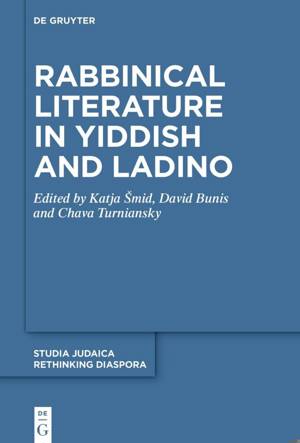
- Retrait gratuit dans votre magasin Club
- 7.000.000 titres dans notre catalogue
- Payer en toute sécurité
- Toujours un magasin près de chez vous
- Retrait gratuit dans votre magasin Club
- 7.000.0000 titres dans notre catalogue
- Payer en toute sécurité
- Toujours un magasin près de chez vous
Rabbinical Literature in Yiddish and Ladino
Description
The volume offers a broad introduction to the rabbinical literature written in the two major traditional Jewish languages of Europe: Yiddish, the language of the Ashkenazic Jews of Eastern Europe, and Ladino (or Judezmo or Judeo-Spanish), the language of the Sephardic Jews of the Ottoman Empire and its successor states, Italy and the Austro-Hungarian Empire.
The scope is wide-ranging. Some of the contributions highlight the lives and work of outstanding rabbinical figures who wrote in Yiddish or Ladino, and the crucial role they played in the transmission of rabbinical knowledge among the more popular sectors of their communities, as well as in the shaping of the Yiddish and Ladino reading public. Close attention is paid to long-established genres such as the highly-popular Biblical commentaries, as exemplified by Me-'am lo'ez in Ladino (1730-1899); prayer books and liturgical compositions in prose and verse; responsa collections; guides to religious observance; moralistic works; as well as modern genres having rabbinic content such as the periodical press that began to appear in the second half of the nineteenth century, when the Jewish communities of the Diaspora underwent radical cultural, religious, social and political changes.
Spécifications
Parties prenantes
- Editeur:
Contenu
- Nombre de pages :
- 400
- Langue:
- Anglais
- Collection :
- Tome:
- n° 139
Caractéristiques
- EAN:
- 9783111575360
- Format:
- Livre relié
- Dimensions :
- 155 mm x 230 mm

Les avis
Nous publions uniquement les avis qui respectent les conditions requises. Consultez nos conditions pour les avis.





